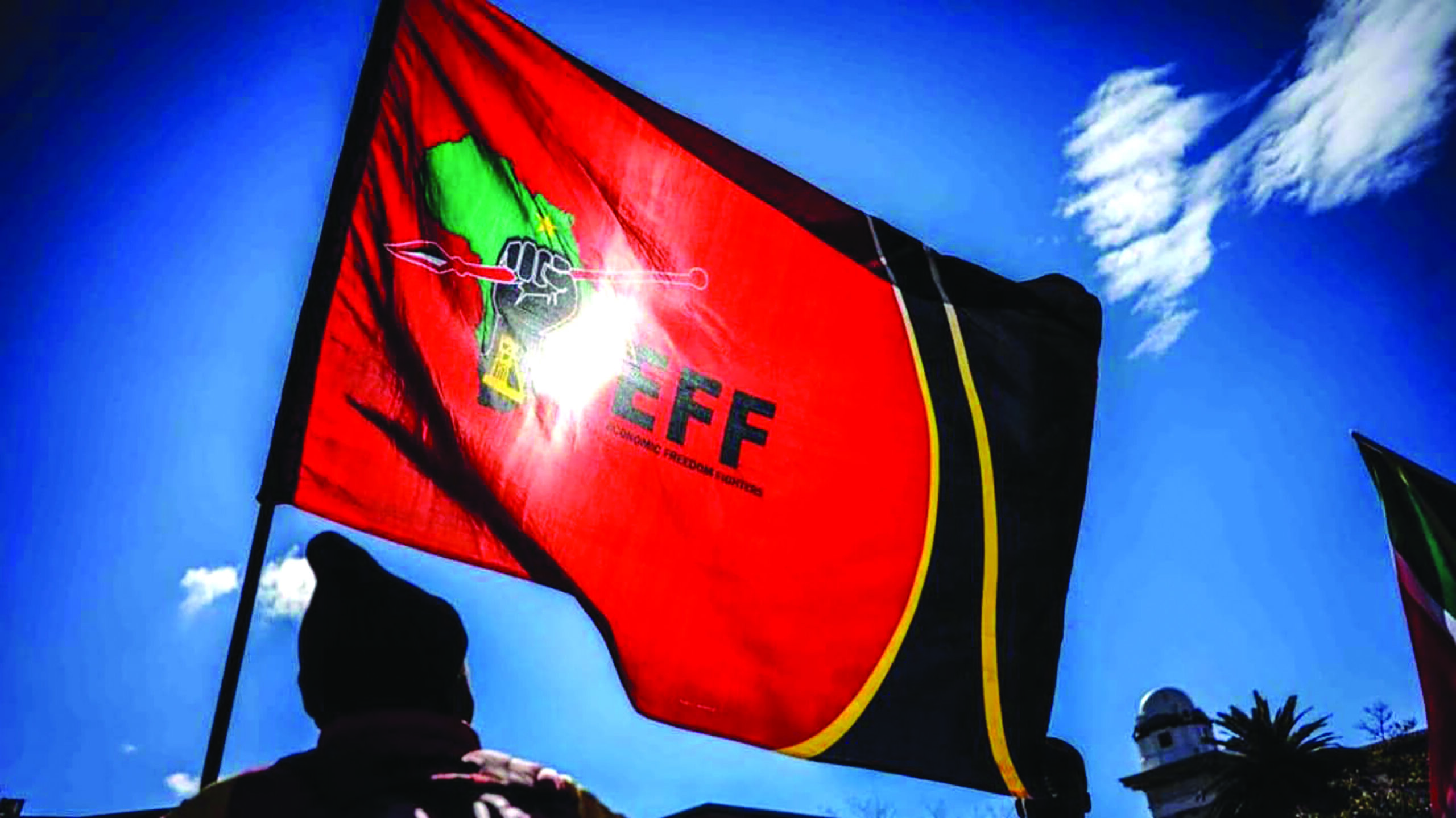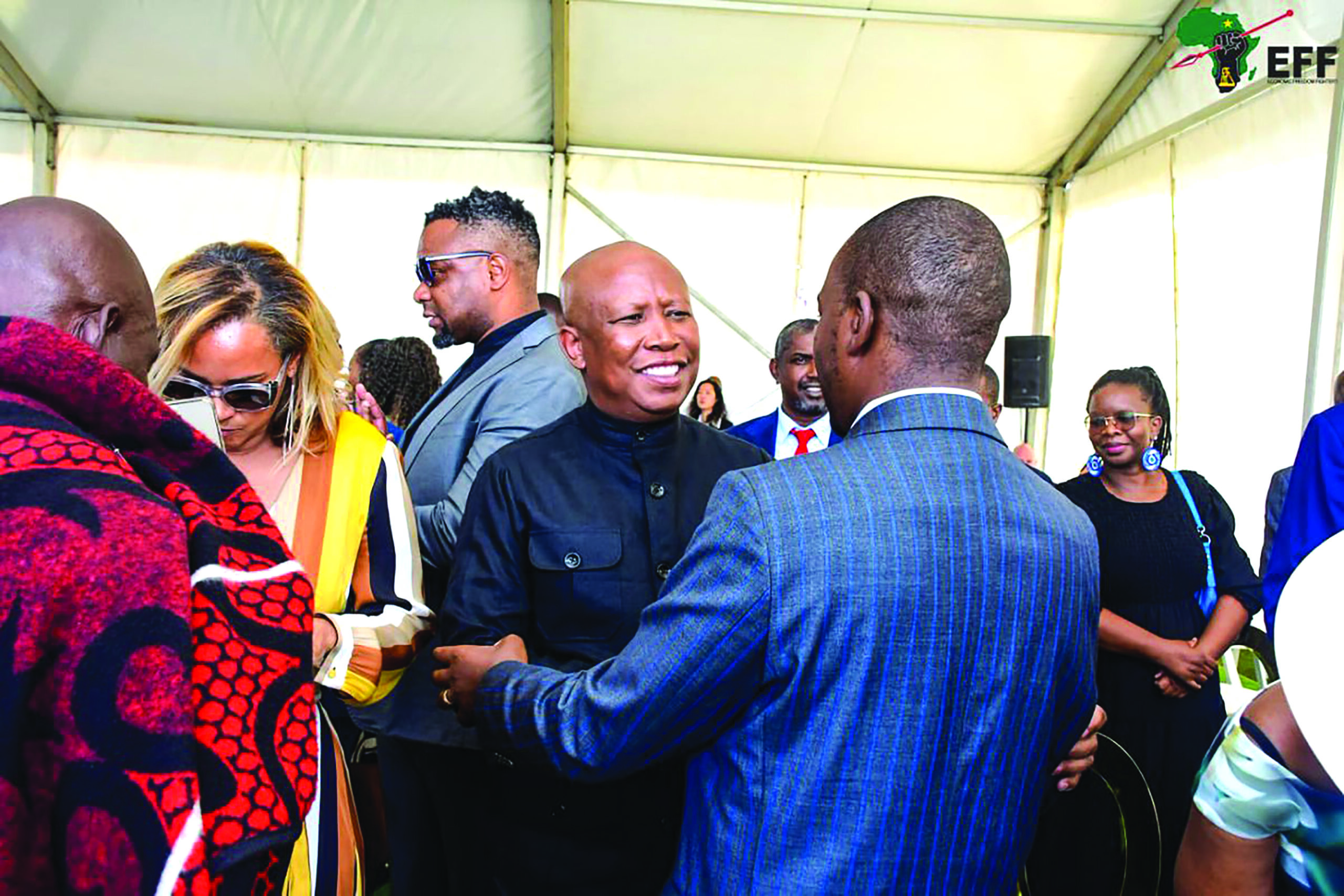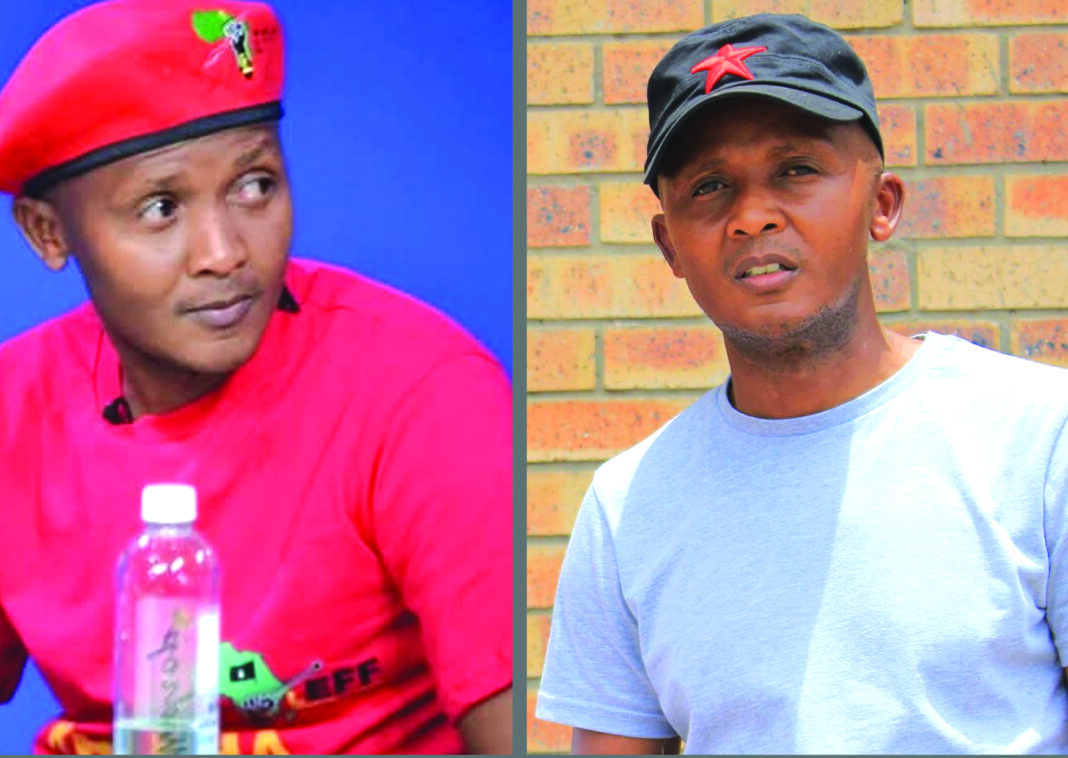Nicole Tau
Radical, passionate, and determined, but also militant and controversial, the political party, Lesotho Economic Freedom Fighters (LEFF), with their distinct bright red berets and black combat boots, has been perceived by the public with both admiration and skepticism. Tefo Makhakhe, from Thuathe in Berea, was at the very center of it all, a key figure in the establishment and leadership of the LEFF, making his mark as a driving force behind the party’s early momentum.
But that is old news. Makhakhe has since left the party and the life of politics behind him, reflecting on those times with pain and regret. LEFF is a branch of the more prominent South African party, the Economic Freedom Fighters (EFF), currently led by Julius Malema, who holds the position of Commander in Chief and president of the party.
Established in 2013, the EFF has been viewed by many as strong advocates for the marginalized and impoverished, fighting for economic justice and land reform. However, their approach has often been described as confrontational and aggressive, utilising disruptive protests and strong rhetoric to achieve their goals, making them a contentious force in South African politics.
During his time as the leader of the LEFF, Makhakhe was instrumental in spreading the EFF’s ideology in Lesotho, becoming a prominent voice for the party’s goals and its commitment to Pan-Africanism. However, the EFF’s presence in Lesotho fizzled out as quickly as it arrived due to internal challenges and disagreements within the LEFF, particularly regarding compliance with the broader EFF’s organisational standards. It is a topic that is very difficult for Makhakhe to share, but as he plans to completely close that chapter of his life, Makhakhe sat down for a final tell-all.
Background and Early Life
Newsday: Can you tell us about your early life? What shaped your initial interest in politics and ultimately led you to join the EFF?
Tefo Makhakhe: When I was around the age of five and onwards, we would occasionally visit and stay with my grandmother. She was deeply involved in a certain political party, so during those visits, we grew up listening to political party songs on cassettes. I really enjoyed those songs, and as I grew older, they gradually pulled me into taking a side politically. However, at home with my parents, any political songs or discussions about politics were considered taboo. As a result, I did not actively pursue politics or develop much interest in it during my childhood and teenage years. In 2011, after graduating from Limkokwing University of Creative Technology (LUCT), I began working to empower the youth in my community. This involved activities like capacity-building initiatives and talent appreciation. During this time, I established a mokhatlo (organisation) called All Possibilities, which initially focused on youth talents. Over time, this organisation evolved into the Appreciation of Capabilities Youth Groups Movement Lesotho. By 2012, the mokhatlo had become very strong.
As a graphic designer and artist, drawing was something I had loved since childhood, I pursued a career in graphic design and visual communications. This enabled me to express my views in ways that resonated with the youth. The mokhatlo continued to grow, expanding into other districts and building a large following. Our youth work gained significant recognition. By 2013, we had extended our efforts to support vulnerable groups through charity initiatives. Our work with the community-led people to ask me to take on a more formal leadership role as a community counsellor, a position with political implications. They believed that working solely in the social sphere might limit my ability to amplify their concerns and represent their needs effectively. That marked the beginning of my political journey. I began learning about politics and comparing it to community work. I soon realised how different the two were. While I initially thought politics was primarily about helping people, I discovered that it often involved complexities that strayed from that purpose. This realisation frustrated me over time, but I stayed committed because I genuinely loved working with people and seeing positive change. Back then, I was a big dreamer with huge ambitions, driven by a desire for transformation.
Newsday: What drew you to the EFF, and what values or ideals of the party resonated most with you at the time?
Tefo Makhakhe: What drew me to the EFF was what the party stands for, its ideologies of socialism and Pan-Africanism. Socialism, for instance, seeks to decentralise the economy, ensuring that its benefits reach everyone rather than allowing a few to grow rich while others remain in poverty. I deeply admired that. Similarly, Pan-Africanism, calling for the unity of African countries that have endured colonialism, apartheid, and other forms of exploitation, also resonated with me. These ideals felt personal to me because I have always believed in the golden rule: what I want for myself, I should also want for others. I have always felt that self-interest alone is not enough. These principles were the biggest reasons why I ultimately joined the EFF.
The Political Journey
Newsday: You were known as a controversial figure during your time with the EFF. Looking back, how do you reflect on those days and the role you played?
Tefo Makhakhe: At the time, I think many people misunderstood me because of my character. Often, people compared me to the leader of the EFF, Julius Malema, and could not reconcile how I fit within the party. But as I have explained, I had my reasons for joining the EFF, and I never intended to mimic Julius Malema. He is his own person, admired for who he is. I did not want to be a copycat. What many people did not see was the impact I was having in communities and among the youth, just by being myself. Some perceived me as too radical or aggressive, but that was not the reality. I think what puzzled people even more was how someone like me, at my age, managed to rise to the position of LEFF leader.
Newsday: Can you share one of the most pivotal or challenging moments from your time in active politics? How did it impact you personally?
Tefo Makhakhe: When LEFF was first introduced in Lesotho, it gained immediate popularity due to the country’s unstable political landscape. People saw LEFF as a potential solution to the chaos. But, this also made the party seem like a threat, which created significant challenges. Some people warned of violence or even murder in politics, especially when a new party like ours disrupted the status quo. It was intimidating, but I stood my ground because I was committed to the idea of change for the country and improving Basotho livelihoods. One of the hardest parts of politics is the constant battles. There are external struggles with opposition forces, but internal conflicts within the party are often the most painful. It is like a fight within a family, it is more damaging than outside attacks. These internal battles affected me deeply. The fight within the family is more dangerous than the one outside the family.

Newsday: The EFF has been described as one of the most polarising political parties in Africa. How did you navigate the party’s often-controversial stance and its public perception?
Tefo Makhakhe: The EFF stands firmly for its principles, and standing for the truth often makes you unpopular. Some will love you for that truth, but others will really hate you. Some people loved the party for its honesty and boldness, but others strongly disliked it. I shared the EFF’s passion for truth and justice, and that kept me motivated, even when faced with criticism or controversy. Another critical aspect was political education. Many Basotho lacked understanding of political ideologies or the essence of EFF’s mission. To address this, I prioritised educating people about our principles, helping them see what EFF stood for and why it was meaningful. I found beauty in these teachings, and it strengthened my resolve despite the challenges.
The Turning Point
Newsday: What was the defining moment that made you decide to leave politics altogether?
Tefo Makhakhe: I decided to leave politics when I realised my spirit was no longer aligned with it. Deep inside, I felt restless, even when achieving significant milestones. My heart lacked peace, and that inner conflict made it clear that politics was no longer my path.
Newsday: You have described your time in politics as “toxic.” Can you elaborate on what you mean by that? Was it the political environment, personal experiences, or something else?
Tefo Makhakhe: Politics, as I have come to learn, is a dark and challenging world. For someone who wants to live an honest life, it is a difficult space to navigate. The system often rewards corruption and dishonesty, making it hard for those with integrity to endure. On a personal level, I felt a disconnect between my spiritual values and the demands of political life. My spirit, the inner essence of who I am, could not thrive in that environment. It is not just about the external challenges; it is also about how politics conflicts with one’s inner peace and beliefs. Even after leaving, the effects linger. Some people continue to admire the work I did, especially in 2017 when I served as a community counselor and accomplished meaningful projects. However, transitioning to other fields has been tough because of how people perceive me based on my political past.
Newsday: How did your personal beliefs and values evolve as you transitioned out of politics?
Tefo Makhakhe: Leaving politics was both a relief and a challenge. The first step for me was introspection, listening to my inner voice and reexamining what brought me peace. I prayed and reflected a lot. What emerged was a realisation that my passions were still rooted in helping others, but in ways that aligned better with my values. I also began pursuing personal growth, exploring opportunities that allowed me to contribute meaningfully to society without compromising my authenticity.
A New Path: Graphic Design and Spirituality
Newsday: After leaving the EFF, what inspired you to pursue graphic design? Was it something you were always passionate about or a new discovery?
Tefo Makhakhe: After I left EFF, I had already gotten my qualification in graphic design. As I am a professional graphic designer, I just continued freelancing the same way I did while I was in politics. So yes, graphics, as I am also an artist, it is my passion. That is why.
Newsday: You have also become deeply spiritual since leaving politics. How has your Christian faith influenced your new path?
Tefo Makhakhe: Kannete, my quest in my spirituality became even more profound when I left politics. Politics can be incredibly distracting and, at times, misleading, often pulling you toward actions that don’t align with your core beliefs. Living a spiritual life requires someone to lead a righteous existence, walking in the Spirit rather than in the flesh. My Christian faith has profoundly influenced my life, not in a purely religious sense but in a deeply spiritual way. I’ve come to know God for who He truly is, not through traditions or customs but through personal connection and understanding.
Newsday: In what ways do you think your political experiences have shaped your perspective on life and work today?
Tefo Makhakhe: My time in politics taught me invaluable lessons, particularly about working with and understanding people. I developed a commendable ability to engage with others and appreciate their diverse perspectives. Wherever I go now, I draw upon these experiences to navigate human dynamics effectively, which has been instrumental in shaping how I approach both life and work.
Public Perception and Challenges
Newsday: Many people still associate you with your past political life. How do you deal with the misconceptions, and what would you like people to know about the “new” Tefo Makhakhe?
Tefo Makhakhe: There is a common phenomenon where people always identify you with your past profession, like a retired policeman who is still seen as a policeman, or a President referred to as a former President. Similarly, people still associate me with politics. I have made peace with that because it is something that will remain in people’s minds. What I would like people to understand about the “new” Tefo Makhakhe is that I am now deeply rooted in spirituality. I have embraced my love for God and my spiritual quest, a love that I have had since my early years but which was delayed or diverted by politics. Now, I am fully immersed in understanding God, the world, and the spiritual realm. That is who I am today.
Insights and Advice
Newsday: Politics and graphic design seem worlds apart. What parallels, if any, do you see between the two?
Tefo Makhakhe: Graphic design is an incredibly broad field, and many leaders possess its skills without even realising it. Take Steve Jobs, for instance, he was a visionary leader and also a graphic designer, mastering typography and calligraphy, which are integral aspects of graphic design. Graphic design is essentially about visual communication, a way to express ideas visually so that others can understand them clearly. Similarly, politics involves communicating messages and ideas effectively to people. For me, having an open mind made it easier to excel in both fields, ensuring that my work as a youth worker, social worker, and politician proceeded smoothly. The ability to convey messages, whether visually or verbally, ties these two worlds together.
Newsday: What lessons have you learned from your journey that you would like to share with others, especially those considering leaving a highly public or controversial career?
Tefo Makhakhe: The most significant lesson I have learned is this: the most vulnerable position a person can find themselves in is relying on others for help. I have been in that position, and it is not about what you want, it is about what others are willing to give at that moment. No matter how much good you have done, people can be unpredictable and flawed. My advice is to never place yourself in a position where your well-being depends solely on others. Instead, go into the world of politics, or any career, with a fixed mindset and flexibility in your expectations. Understand that trust is fragile, and people’s support can be fleeting. Prepare yourself mentally, and you will navigate such challenges more effectively.
Newsday: If you could go back in time and give your younger self advice, knowing what you do now, what would you say?
Tefo Makhakhe: Work hard, but above all, remember to lead a compassionate life. Your life is one, and you should not overwork yourself trying to impress others, especially if they might not show gratitude in return. Also, start pursuing God at a young age, because that is the true life, not these others that only serve this world. When you die, you will remain here, having worked only for the temporary, instead of for the world that is to come.

Looking Forward
Newsday: What are your future aspirations in graphic design, and how do you plan to continue building this new chapter of your life?
Tefo Makhakhe: In the future, I want to pursue graphic design with determination, even though I do not have a complete vision of where I want to be yet. My primary focus right now is on achieving peace. As you grow older, you realize that peace is what matters most, far more than fame, money, or other material things. I will continue working in graphic design, but in a way that brings me peace and contentment.
Newsday: Do you see yourself ever returning to politics in any capacity? Why or why not?
Tefo Makhakhe: I do not think I will go back to politics, because my spiritual life has become bigger than politics, it is now my main focus. Politics often leads to things that diminish spiritual strength. As I have said before, its origins feel dark to me, and I believe it is not compatible with the spiritual path I am pursuing.
Newsday: How do you hope to inspire others who might also be seeking a fresh start in their own lives?
Tefo Makhakhe: To younger people or anyone listening, I would say this: work hard, but do not do it to impress or please others, it is a dangerous path. If people do not respond as you hope, it can hurt deeply. Remember, every action has a reaction, so focus on working for what truly matters to you, rather than seeking validation from others.
Final Reflection
Newsday: If you were to summarize your transformation in one sentence, what would it be?
Tefo Makhakhe: Almost everything is possible, especially with God. (I never thought I could leave the life I was so passionate about politics, social work, and youth work. I had set aside countless opportunities, including business opportunities, in pursuit of politics. But now, I have left that life and found peace in a way I have never experienced before).
Summary
- Tefo Makhakhe, from Thuathe in Berea, was at the very center of it all, a key figure in the establishment and leadership of the LEFF, making his mark as a driving force behind the party’s early momentum.
- During his time as the leader of the LEFF, Makhakhe was instrumental in spreading the EFF’s ideology in Lesotho, becoming a prominent voice for the party’s goals and its commitment to Pan-Africanism.
- It is a topic that is very difficult for Makhakhe to share, but as he plans to completely close that chapter of his life, Makhakhe sat down for a final tell-all.

Your Trusted Source for News and Insights in Lesotho!
At Newsday Media, we are passionate about delivering accurate, timely, and engaging news and multimedia content to our diverse audience. Founded with the vision of revolutionizing the media landscape in Lesotho, we have grown into a leading hybrid media company that blends traditional journalism with innovative digital platforms.






